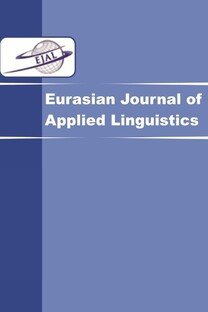Enhancing Critical Awareness through Socratic Pedagogy
Socratic pedagogy, critical awareness, Spoken English, , diasadvantaged groups cooperative learning,
___
- Altorf, H. M. (2016). Dialogue and discussion: Reflections on a Socratic method. Arts and Humanities in Higher Education, 18(1), 60-75. doi: 10.1177/1474022216670607 Antonek, J. L., McCormick, D. E., & Donato, R. (1997). The Student Teacher Portfolio as autobiography: Developing a professional identity. The Modern Language Journal, 81(1), 15. doi: 10.2307/329158 Balbay, S., Pamuk, İ., Temir, T., & Doğan, C. (2018). Issues in pre-service and in-service teacher training programs for university English instructors in Turkey. Journal of Language and Linguistic Studies, 14(2), 48-60. Bartlett, R. C. (2008). Masters of Greek Thought: Plato, Socrates, And Aristotle [Audiobook]. Retrieved from https://www.thegreatcourses.com/courses/masters-of-greek-thought-plato-socrates-and-aristotle.html Bartolome, L. (1994). Beyond the methods fetish: Toward a humanizing pedagogy. Harvard Educational Review, 64, 173–194. Behar-Horenstein, L. S., & Niu, L. (2011). Teaching critical thinking skills in higher education: A review of the literature. Journal of College Teaching & Learning, 8(2). doi: 10.19030/tlc.v8i2.3554 Beltman, S., Glass, C., Dinham, J., Chalk, B., & Nguyen, B. (2015). Drawing identity: Beginning pre-service teachers’ professional identities. Issues in Educational Research, 25(3), 225-245. Bhaerman, R. D. (1970). The oral/written Socratic Method. Improving college and university teaching, 18(2), 126-128. doi: 10.1080/00193089.1970.10532954 Black, S. (2005). Teaching students to think critically. The Education Digest, 70(6), 42-47. Boghossian, P. (2002). The Socratic Method (Having a right to get stoned). Teaching Philosophy, 25(4), 345-359. doi: 10.5840/teachphil200225443 Boghossian, P. (2006). Behaviorism, Constructivism, and Socratic Pedagogy. Educational Philosophy and Theory, 38(6), 713-722. doi: 10.1111/j.1469-5812.2006.00226.x Borren, M. (2013). A sense of the world: Hannah Arendt’s hermeneutic phenomenology of common sense. International Journal of Philosophical Studies 21(2), 225–255. Brott, P.E. & Kajs, L.T. (2001). Developing the professional identity of first-year teachers through a ‘Working Alliance’. Retrieved August 10, 2019, from http://www.alt-teachercert.org/Working%20Alliance.html Chapelle, C. A., & Duff, P. A. (2003). Some Guidelines for Conducting Quantitative and Qualitative Research in TESOL. TESOL Quarterly, 37(1), 157–178. doi: 10.2307/3588471 Chong, S., Low, E. L., & Goh, K. C. (2011). Developing student teachers’ professional identities – An exploratory study. International Education Studies, 4(1), 30-38. doi: 10.5539/ies.v4n1p30 Choy, S. C., & Cheah, P. K. (2009). Teacher perceptions of critical thinking among students and its influence on higher education. International Journal of Teaching and Learning in Higher Education, 20(2), 198-206. Crawford, L. M. (1978). Paulo Freire’s philosophy: Derivation of curricular principles and their application to second language curriculum design (Unpublished doctoral dissertation). University of Minnesota, Minneapolis. Crookes, G., & Lehner, A. (1998). Aspects of process in an ESL critical pedagogy teacher education course. TESOL Quarterly, 32(2), 319. doi: 10.2307/3587586 Dikilitas, K., Wyatt, M., Burns, A., & Barkhuizen, G. (2019). Energising Teacher Research. Kent: IATEFL. Duron, R., Limbach, B., & Waugh, W. (2006). Critical thinking framework for any discipline. International Journal of Teaching and Learning in Higher Education, 17(2), 160-166. Ennis, R. H. (1989). Critical thinking and subject specificity: Clarification and needed research. Educational Researcher, 18(3), 4-10. Filkins, S. (n.d.). Strategy Guide: Socratic Seminars. Retrieved February 6, 2019, from http://www.readwritethink.org/professional-development/strategy- guides/socratic-seminars-30600.html Freire, P. (2005). The banking concept of education. In D. Bartholomae, & A. Petrosky, Ways of reading. (7th ed.). New York: St. Martin’s Press. Gratch, A. (2001). The culture of teaching and beginning teacher development. Teacher Education Quarterly, 28(4), 121-136. Kelchtermans, G., & Ballet, K. (2002). The Micropolitics of teacher induction: A narrative-biographical study on teacher socialization. Teaching and Teacher Education, 18, 105-120. doi: 10.1016/S0742-051X(01)00053-1 Kırkgöz, Y. (2017). English education policy in Turkey. In English language education policy in the Middle East and North Africa (pp. 235-256). Cham, Switzerland: Springer. Kırkgöz, Y., Çelik, S. & Arıkan, A. (2016). Laying the theoretical and practical foundations for a new elementary English curriculum in Turkey: A procedural analysis. Kastamonu Education Journal 24(3), 1199–1212. Madison, D. S. (2005). Critical ethnography: Methods, ethics, and performance. Thousand Oaks, CA: Sage. Mayer, J. (1986). Teaching critical awareness in an introductory course. Teaching Sociology, 14(4), 249-256. doi: 10.2307/1318382 McNamara, T. (2012). Poststructuralism and its challenges for applied linguistics. Applied Linguistics, 33(5), 473-482. Morrow, R. A., & Brown, D. D. (1994). Critical theory and methodology. Thousand Oaks, CA: Sage Nelson, L. (2004). ‘The Socratic Method’. R. Saran & B. Neiser (eds.). Enquiring Minds: Socratic Dialogue in Education. Stoke on Trent: Trentham, 126-165. Nickerson, R. S. (1994). The teaching of thinking and problem solving. In R. J. Sternberg (Ed.), Thinking and problem solving (pp. 121-132). San Diego: Academic Press. Lee, I. (2007). Preparing pre-service English teachers for reflective practice. ELT Journal, 61(4), 321-329. doi: 10.1093/elt/ccm022 Pennycook, A. (1994). Critical pedagogical approaches to research. TESOL Quarterly, 28(4), 690-693. Schwarze, S. & Lape, H. (2000). Thinking Socratically: critical thinking about everyday issues (2nd edn.). New York, Prentice Hall. Sternberg, R. J., & Williams, W. M. (2002). Educational psychology. Boston: Allyn and Bacon. The six types of Socratic questions. (n.d.). Retrieved February 12, 2019, from http://www.umich.edu/~elements/probsolv/strategy/cthinking.htm Osam, U. V. & Balbay, S. (2004). Investigating the decision-making skills of cooperating teachers and student teachers of English in a Turkish context. Teaching and Teacher Education. 20, 745-758. Valli, L. (1997). Listening to other voices: A description of teacher reflection in the United States. Peabody Journal of Education, 72(1), 67-88. doi: 10.1207/s15327930pje7201_4
- ISSN: 2149-1135
- Yayın Aralığı: 3
- Başlangıç: 2015
- Yayıncı: Ece Zehir Topkaya
Gholam Hassan Khajavy, Hossein Makiabadi, Samaneh Abdi Navokhi
Variations in the Citation Use and Perceptions in Writing the Literature Review by EFL Postgraduates
Siti Jamilah Bidin, Nayef Jomaa Jomaa
Review of Linguistic Pragmatics of Intercultural Professional and Business Communication
Using Contrastive Terminology Analysis in Teaching a Foreign Language
Chunxiang Wu, Jennifer Baccanello
Review of Corpus Linguistics for Vocabulary: A Guide for Research
